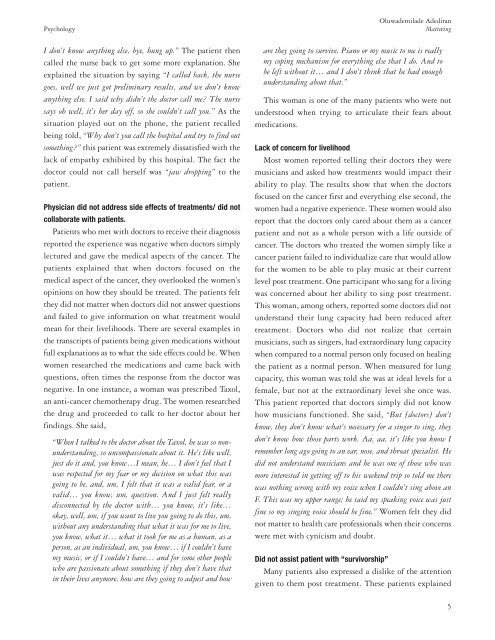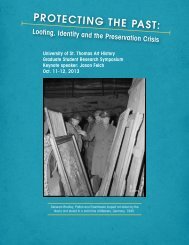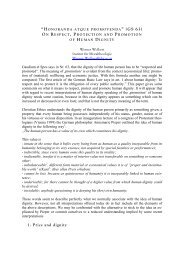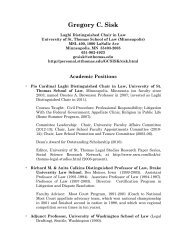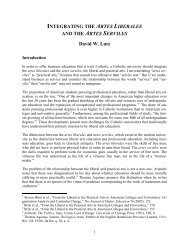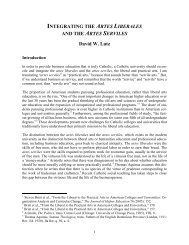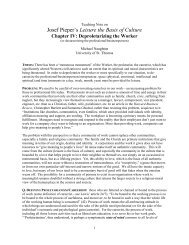dr. ronald e. mcnair acknowledgements - University of St. Thomas
dr. ronald e. mcnair acknowledgements - University of St. Thomas
dr. ronald e. mcnair acknowledgements - University of St. Thomas
Create successful ePaper yourself
Turn your PDF publications into a flip-book with our unique Google optimized e-Paper software.
Oluwademilade Adediran<br />
Psychology Mattering<br />
I don’t know anything else, bye, hung up.” The patient then<br />
called the nurse back to get some more explanation. She<br />
explained the situation by saying “I called back, the nurse<br />
goes, well we just got preliminary results, and we don’t know<br />
anything else. I said why didn’t the doctor call me? The nurse<br />
says oh well, it’s her day <strong>of</strong>f, so she couldn’t call you.” As the<br />
situation played out on the phone, the patient recalled<br />
being told, “Why don’t you call the hospital and try to find out<br />
something?” this patient was extremely dissatisfied with the<br />
lack <strong>of</strong> empathy exhibited by this hospital. The fact the<br />
doctor could not call herself was “jaw <strong>dr</strong>opping” to the<br />
patient.<br />
Physician did not ad<strong>dr</strong>ess side effects <strong>of</strong> treatments/ did not<br />
collaborate with patients.<br />
Patients who met with doctors to receive their diagnosis<br />
reported the experience was negative when doctors simply<br />
lectured and gave the medical aspects <strong>of</strong> the cancer. The<br />
patients explained that when doctors focused on the<br />
medical aspect <strong>of</strong> the cancer, they overlooked the women’s<br />
opinions on how they should be treated. The patients felt<br />
they did not matter when doctors did not answer questions<br />
and failed to give information on what treatment would<br />
mean for their livelihoods. There are several examples in<br />
the transcripts <strong>of</strong> patients being given medications without<br />
full explanations as to what the side effects could be. When<br />
women researched the medications and came back with<br />
questions, <strong>of</strong>ten times the response from the doctor was<br />
negative. In one instance, a woman was prescribed Taxol,<br />
an anti-cancer chemotherapy <strong>dr</strong>ug. The women researched<br />
the <strong>dr</strong>ug and proceeded to talk to her doctor about her<br />
findings. She said,<br />
“When I talked to the doctor about the Taxol, he was so nonunderstanding,<br />
so uncompassionate about it. He’s like well,<br />
just do it and, you know…I mean, he… I don’t feel that I<br />
was respected for my fear or my decision on what this was<br />
going to be, and, um, I felt that it was a valid fear, or a<br />
valid… you know, um, question. And I just felt really<br />
disconnected by the doctor with… you know, it’s like…<br />
okay, well, um, if you want to live you going to do this, um,<br />
without any understanding that what it was for me to live,<br />
you know, what it… what it took for me as a human, as a<br />
person, as an individual, um, you know… if I couldn’t have<br />
my music, or if I couldn’t have… and for some other people<br />
who are passionate about something if they don’t have that<br />
in their lives anymore, how are they going to adjust and how<br />
are they going to survive. Piano or my music to me is really<br />
my coping mechanism for everything else that I do. And to<br />
be left without it… and I don’t think that he had enough<br />
understanding about that.”<br />
This woman is one <strong>of</strong> the many patients who were not<br />
understood when trying to articulate their fears about<br />
medications.<br />
Lack <strong>of</strong> concern for livelihood<br />
Most women reported telling their doctors they were<br />
musicians and asked how treatments would impact their<br />
ability to play. The results show that when the doctors<br />
focused on the cancer first and everything else second, the<br />
women had a negative experience. These women would also<br />
report that the doctors only cared about them as a cancer<br />
patient and not as a whole person with a life outside <strong>of</strong><br />
cancer. The doctors who treated the women simply like a<br />
cancer patient failed to individualize care that would allow<br />
for the women to be able to play music at their current<br />
level post treatment. One participant who sang for a living<br />
was concerned about her ability to sing post treatment.<br />
This woman, among others, reported some doctors did not<br />
understand their lung capacity had been reduced after<br />
treatment. Doctors who did not realize that certain<br />
musicians, such as singers, had extraordinary lung capacity<br />
when compared to a normal person only focused on healing<br />
the patient as a normal person. When measured for lung<br />
capacity, this woman was told she was at ideal levels for a<br />
female, but not at the extraordinary level she once was.<br />
This patient reported that doctors simply did not know<br />
how musicians functioned. She said, “But [doctors] don’t<br />
know, they don’t know what’s necessary for a singer to sing, they<br />
don’t know how those parts work. Aa, aa, it’s like you know I<br />
remember long ago going to an ear, nose, and throat specialist. He<br />
did not understand musicians and he was one <strong>of</strong> those who was<br />
more interested in getting <strong>of</strong>f to his weekend trip so told me there<br />
was nothing wrong with my voice when I couldn’t sing above an<br />
F. This was my upper range; he said my speaking voice was just<br />
fine so my singing voice should be fine.” Women felt they did<br />
not matter to health care pr<strong>of</strong>essionals when their concerns<br />
were met with cynicism and doubt.<br />
Did not assist patient with “survivorship”<br />
Many patients also expressed a dislike <strong>of</strong> the attention<br />
given to them post treatment. These patients explained<br />
5


